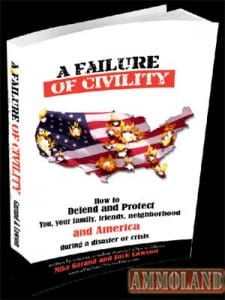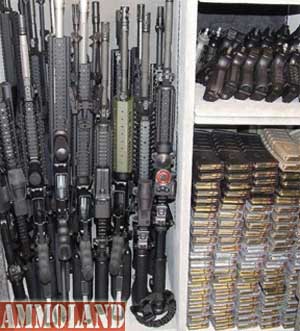

USA –-(Ammoland.com)- Some of the conventional wisdom in the “prepper” community suggests that if disaster strikes, the best option for survival is “bugging out,” or fleeing suburban and urban areas for distant rural retreats.
There is an entire genre of survivalist fiction and non-fiction books that mythologize the highly-skilled “lone wolf” survivalist in isolated redoubt standing alone against the horde, and that is, in part, a reflection of the “can do” spirit of rugged American individualism.
That mythology, unfortunately, doesn’t work well for real people living in a modern world.
In an economy where most Americans are living paycheck-to-paycheck, purchasing a remote retreat property is a pipe dream. Building a specialized second home far away, then fortifying it and provisioning it, simply isn’t realistic from a financial perspective for the vast majority of the population. Thinking that you are going to drive, bike, or walk out of suburban and urban areas and live off of “bugs, berries, and tree bark” like so many 200-lbs. locusts is staggeringly unrealistic. Most people lack the skills to discern what is edible and what isn’t, and those who do know will be competing against both those who don’t, and the people who already live in their areas, who won’t take kindly to those who threaten their food and water supplies.
Compounding the basic issue of survival are the very messy realities of family life. No two families are the same, and those that have the very young, very old, the physically unfit and the medically infirm, have their own list of requirements and challenges.
But the core argument against bugging out is that it requires you give up the greatest assets that you own: your home, and your place in your community. Simply stand up and walk around your house, and look at all the essential resources you’d be leaving behind. How will you replicate them?
If it helps, think of what it’s like to pack for a short camping trip… and then think of what you need for a very very long term camping trip… which is almost everything.

In the book “A Failure of Civility,” Mike Garand and Jack Lawson make a compelling argument for sheltering in place.
Your home, whether it is a freestanding building, townhome, or apartment, provides you with one of the core essentials of survival: shelter. It protects you from exposure to the elements and serves to moderate day-to-day temperature extremes. It may also protect you, to a lesser extent, against other people, predators, scavengers, and insect-borne disease. A home also plays a primary role in sheltering and protecting those things that you need to survive a disaster, from your clothing and bedding to your tools and food and water supplies.
In a high level, head-to-head comparison, bugging out does not fair well for most people when compared to sheltering in place.
- Bugging out carries with with it immediate weight and bulk limitations. You can only transport so much by backpack or vehicle. Sheltering in place allows you to store and maintain as much as you want, with much more generous weight and bulk allowances.
- Bugging out carries inherent risk during transport from one location to another, and you cannot be assured that you destination will be intact/secure when you arrive. Sheltering in place removes the transportation risk, if at the risk of having your supplies located in one place.
- Bugging out threatens and may eliminate social bonds and mutual support. Sheltering in place with an active neighborhood protection plan, gives you important psychological support and strength in numbers.
“A Failure of Civility” is designed to help you and like-minded neighbors develop a Neighborhood Protection Plan (NPP) flexible enough so that if any of these disaster of civil unrest occurs, you will be part of a group that has the training, supplies, and mindset to survive in the communities in which you live, without abandoning all you hold dear.
No one has a crystal ball to know if or when a disaster will strike, but those who plan for it as a community are going to have a better chance of coming out the other side intact and in higher spirits than those attempting to face disaster alone.
Softcover copies of A Failure of Civility can be purchased directly from the authors via the book’s web site, or can be purchased as a softcover or as a Kindle eBook on Amazon.com.
When the worst comes to pass, there is no place like home.
About Bob Owens
Bob Owens is native of North Carolina who began blogging at the politics-focused Confederate Yankee in November 2004 before transitioning to Bob-Owens.com in 2011. He also writes at Pajamas Media and Shooting Illustrated, and occasionally does Twitter.
